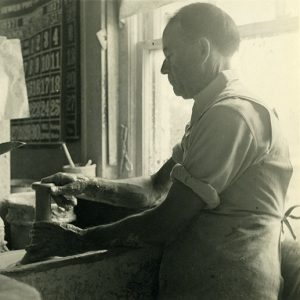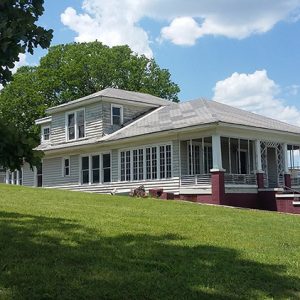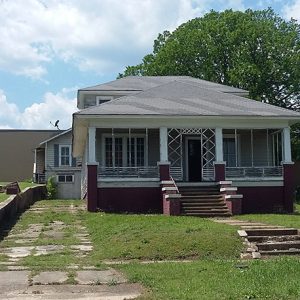calsfoundation@cals.org
Charles Dean Hyten (1877–1944)
Charles Dean “Bullet” Hyten was a master potter and the originator of the famous Niloak Pottery. Although he was not the first pottery maker in Saline County, his patented swirl technique and use of locally sourced clay gave his pottery a unique look. Because Hyten’s pottery-making process was a trade secret, his creations became valuable historic artifacts.
Charles Hyten was born in Benton (Saline County) on March 14, 1877, to John F. Hyten and Hattie E. Brown Hyten. His father, a potter by trade, had moved the family to Benton around 1876. There, he opened a pottery business and continued working until his death in 1881 following an illness. Hattie Hyten, widowed with four children, married Frank Woosley, who had worked for John Hyten and had helped cared for him during his illness. Hattie and Frank Woosley had two children, Fren and Angie, before moving to Springfield, Ohio. Charles and his brothers Paul and Lee took control of the family business from Woosley in 1896.
The Hyten brothers stayed in Benton making clay pottery; Paul and Lee left by 1901, and Charles Hyten continued without them, renting the business until 1902, when he had acquired enough capital from working as a journeyman potter to take it over.
Hyten married Cora Caldwell on February 5, 1901. They had four children.
Hyten renamed his operation Eagle Pottery in 1902. Seven years later, Hyten began experimenting with colored clays found on Pottery Hill in Benton. In 1909, with the help of fellow potter Arthur Dovey, Hyten developed the signature “mission swirl” design known as Niloak. The original pottery business burned in 1901 and again in 1912. Hyten relocated to the end of Pearl Street to be closer to shipping facilities, but he continued to utilize the rich clay deposits along what is now Military Road in Benton. Hyten owned thirty-five acres of clay deposits there at one time.
By the early 1920s, Hyten had organized the Niloak Pottery Company as sole owner of the business, and the pottery was sold nationwide. Reportedly, he personally inspected every piece of pottery that came out of his factory. In 1929, the Niloak Pottery Company showroom was built along Military Road. A fire nearly destroyed it in 1932.
The Great Depression led Hyten to sell the company to Hardy Lathan Winburn III in 1934. Under new ownership, the company turned to government contracts, making clay pigeons, electrical conductors, and coffee cups. It dissolved in 1947.
Charles Hyten was a member of the Presbyterian Church in Benton, where he was superintendent of the Sunday school. He was a stockholder in the Bank of Benton, secretary and treasurer of the Southern Bauxite Company, and a member of Benton’s Masonic Lodge. By 1930, he was a 32nd Degree Mason.
On September 6, 1944, Hyten drowned. He was attending a Sunday school picnic on the Saline River at Camp Gordon Gray four miles west of Little Rock (Pulaski County). While wading in the water with two children, Hyten stepped into a deep hole. One of the children clung to a nearby tree while the other went for help when Hyten failed to resurface. His body was located about an hour later. He was buried in Old Rosemont Cemetery in Benton.
After Hyten’s death, the showroom on Military Road and his Pearl Street factory were torn down. In 1976, the Saline County Sesquicentennial Committee placed a marker just south of where the Niloak showroom once stood on Military Road. Hyten’s home was placed on the National Register of Historic Places in 2012.
For additional information:
“C. A. [sic] Hyten Drowns Near Benton.” Arkansas Gazette, September 7, 1944, p. 12.
“C. D. Hyten Loses Life by Drowning in Saline River.” Benton Courier, September 7, 1944, p. 1.
Fields, Kelsey. “Charles ‘Bullet’ Dean Hyten House.” National Register of Historic Places registration form. On file at Arkansas Historic Preservation Program, Little Rock, Arkansas. Online at http://www.arkansaspreservation.com/National-Register-Listings/PDF/SA0124.nr.pdf (accessed February 13, 2018).
Rainey, Arlene Hyten. “Pottery Hill Military Road.” In Saline County: Recollections of Early Settlers. 2nd ed. Benton, AR: Saline County History and Heritage Society, 2015.
Thomas, David Yancey. Arkansas and its People: A History. Vol. 3. New York: American Historical Society, Inc., 1930.
Cody Lynn Berry
Benton, Arkansas









Comments
No comments on this entry yet.